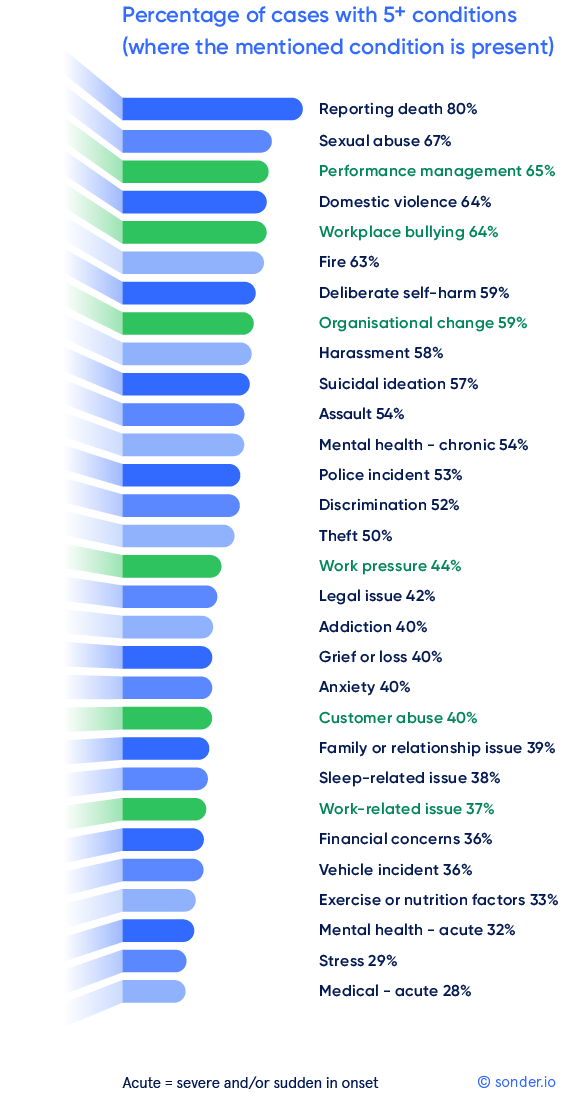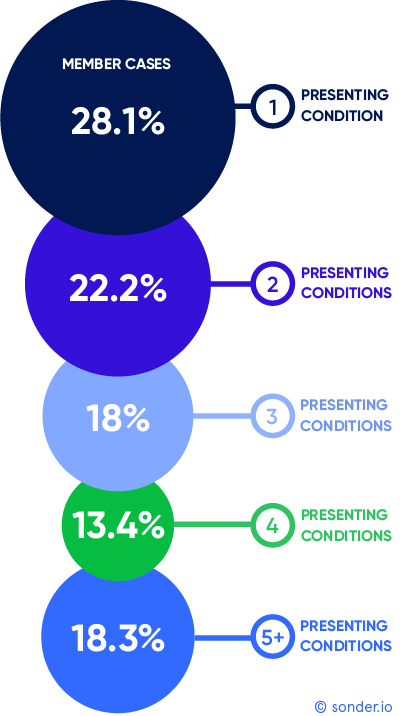Rapid transformation has become a staple of the modern workplace. Technological advances and skills shortages combined with rising costs and productivity pressures, mean that organisations are continually exploring ways to gain a competitive edge. But, whilst leaders tend to love the yellow-brick-road promise of what organisational change will bring, they’re not always mindful of how restructures, new leadership and changed working conditions can impact the health and wellbeing of their team.
One of the first studies to examine the health risks of organisational change was a 1997 Finnish study that found the risk of health problems was at least two times greater after major downsizing, compared to organisations that remained the same size. “This risk varies according to individual factors, such as age, socioeconomic status, and health, as well as factors related to place of work, for example, size and age structure of the staff,” said Vahtera, Kivimäki, and Pentti.
Since then, many studies have linked organisational change with an “elevated risk of mental health problems,” reported Bamberger, Vinding, Larsen, and Nielsen in 2012. Increased workload, time pressure, and reduction in social support are listed among the biggest stressors in organisations undergoing change.
Uncertainty exacerbates stress
While change itself is stressful, it is the uncertainty around change that can have a larger impact on employee wellbeing.
“Uncertainty is a major source of psychological strain during organizational change” due to feelings of lack of control, concluded Paulsen and Tourish.
A study of 632 public sector employees found that “concerns about change, measured during the anticipation stage of an organizational change process, relate to higher burnout and lower work engagement”.
Job insecurity is another common concern during times of change – especially during organisational restructuring or company mergers – which has also been linked to detrimental effects on the mental health of workers, reported Sverke, Hellgren, and Naswall.
Organisational change is associated with some of the most complex support cases
Of our 10,000+ active member support cases last quarter, we found that organisational change was associated with some of the most complex support cases.
Where organisational change (including restructures, new leadership, and changed working conditions) was identified as one of the presenting factors, more than 80 per cent of these cases had four or more other conditions present, and more than half of the cases had five or more other conditions present.
The majority of these cases included concerns related to work-related pressure, and feelings of stress and/or anxiety. The more severe cases included acute medical and/or mental health issues.
Other high-ranking complex case types involved performance management, workplace bullying, work pressure, customer abuse, and/or a work-related issue.

Wellbeing support needs are often complex, and the impact compounded for each challenge
Most employees reaching out for support are contending with multiple, intertwined challenges. This means most employees needed support for more than one condition, and their support needs were often complicated by the fact that the impact was compounded for each challenge.
Last quarter, we saw 28.1 per cent of employee support cases involved one presenting condition, 22.2 per cent involved two conditions, 18 per cent involved three conditions, 13.4 per cent involved four conditions, and 18.3 per cent involved five conditions.

Interestingly, across our cohort of 10,000+ active member support cases last quarter, our data showed no strong correlation between the various presenting issues. Each person experienced a situation or challenge differently and it was not possible to generalise how each individual was affected.
This complexity can be missed in a self-help app that is not overseen by accredited clinicians who can triage through the lens of a holistic wellbeing model across mind, body, community, and environment.
What does this mean for managers?
Managers play a crucial role in organisational change – helping people understand, adapt, and move forward with the proposed changes. But, they are typically more aware of the logistical impact than the people impact.
When managers are expediting organisational change, their people are not coping as well as they might assume. Workplace changes can cause employees to worry about how the changes will affect them and feel stressed about their financial security. This in turn might cause them to lose sleep, change their eating habits, suffer from reduced energy levels, and trigger their historical back pain.
Managers like to set a fast change management pace, but they need to appreciate that people who are feeling anxious or stressed about changes at work might also be dealing with medical and/or mental health issues (often as a result of or exacerbated by the changes at work). People need time, consultation, and to feel a sense of control over their situation.
Managers as “nerve centres” for their teams
Managers themselves can feel stressed with the burden of organisational change when they’re under pressure from their leaders to push initiatives through quickly.
Research indicates that when managers are stressed, their subordinates are too. One study of 5,688 Danish employees found that managers can ‘transmit’ stress to their employees. Not just temporary stress during the change period, but effects that can linger for a year, and can take up to two years to fade.
The study “emphasizes the importance of the psychosocial wellbeing of managers as ‘nerve centres’ for entire job teams and urges organisations to treat stress among personnel on management levels with a high degree of concern”.

5 tips for HR/P&C leaders
Seasoned HR/P&C leaders understand that accelerated organisational change can have negative effects on their people. But, it’s sometimes hard to slow down a freight train when the rest of your organisation wants it to move quickly.
Here are some suggested areas of focus:
1. Help managers be mindful of the impacts of organisational change. Educate them on the data we’re seeing. Prepare some hypothetical case studies so they can understand how changes in the workplace can have both a positive and negative impact on their teams.
2. Remind managers to monitor their own stress levels. Empower them to reach out for personal wellbeing support when needed, to help reduce the transference of stress onto their teams.
3. Build a culture that understands complexity. Raise awareness about how health is complex and impacts people differently. Encourage a mindset that challenges assumptions about wellbeing. Normalise conversations about holistic health.
4. Encourage leaders to walk the talk. Help them to champion employee wellbeing (always, but especially) during rapid transformational change. Your managers and their teams will look to the top for guidance, which is the opportune time for your leaders to embrace, promote, and personally use your organisation’s wellbeing initiatives.
5. Understand that most employees need more than a standard EAP. With safety, medical, and mental health needs intertwining, standard EAP offerings usually cannot provide the holistic support that employees need. If your wellbeing support provider does not offer all three, consider supplementing their services with other providers so your people have the full support they need when they need it.
Want to learn more?
For more information about how Sonder can help you rethink your employee and student support, we invite you to contact us here.
For Sonder customers who have not already received a copy of our in-depth Quarterly trends report last quarter, we invite you to reach out to your point of contact at Sonder to access our full data, insights, and commentary.
About Sonder
Sonder is a technology company that helps organisations improve the wellbeing of their people so they perform at their best. Our mobile app provides immediate, 24/7 support from a team of safety, medical, and mental health professionals – plus onsite help for time-sensitive scenarios. Accredited by the Australian Council on Healthcare Standards (ACHS), our platform gives leaders the insights they need to act on tomorrow’s wellbeing challenges today.



